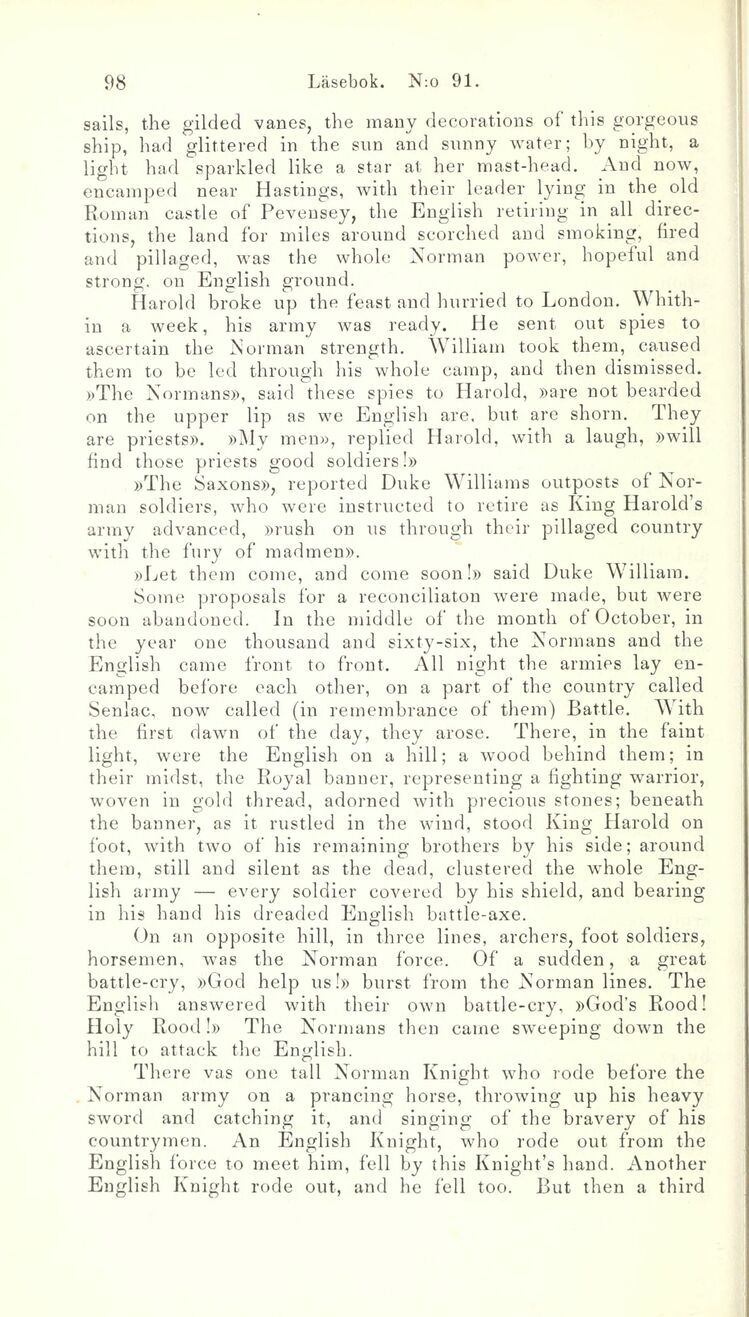
Full resolution (JPEG) - On this page / på denna sida - Läseboken - Stories of the Earlier History of England - 91. Harold the Second, and William the Conqueror

<< prev. page << föreg. sida << >> nästa sida >> next page >>
Below is the raw OCR text
from the above scanned image.
Do you see an error? Proofread the page now!
Här nedan syns maskintolkade texten från faksimilbilden ovan.
Ser du något fel? Korrekturläs sidan nu!
This page has never been proofread. / Denna sida har aldrig korrekturlästs.
98
Läsebok. iS:o 94.
sails, the gilded vanes, the many decorations of this gorgeous
ship, had glittered in the sun and sunny water; by night, a
light had sparkled like a star at her mast-head. And now,
encamped near Hastings, with their leader lying in the old
Roman castle of Pevensey, the English retiring in all
directions, the land for miles around scorched and smoking, lired
and pillaged, was the whole Norman power, hopeful and
strong, on English ground.
Harold broke up the feast and hurried to London.
Whith-in a week, his army was ready. He sent out spies to
ascertain the Norman strength. William took them, caused
them to be led through his whole camp, and then dismissed.
»The Normans», said these spies to Harold, »are not bearded
on the upper lip as we English are. but are shorn. They
are priests». »Älv men», replied Harold, with a laugh, »will
find those priests good soldiers!»
»The Saxons», reported Duke Williams outposts of
Norman soldiers, who were instructed to retire as King Harold’s
army advanced, »rush on us through their pillaged country
with the fury of madmen».
»Let them come, and come soon!» said Duke William.
Some proposals for a reconciliaton were made, but were
soon abandoned. In the middle of the month of October, in
the year one thousand and sixty-six, the Normans and the
English came front to front. All night the armies lay
encamped before each other, on a part of the country called
Senlac, now called (in remembrance of them) Battle. With
the first dawn of the day, they arose. There, in the faint
light, were the English on a hill; a wood behind them; in
their midst, the Royal banner, representing a fighting warrior,
woven in gold thread, adorned with precious stones; beneath
the banner, as it rustled in the wind, stood King Harold on
foot, with two of his remaining brothers by his side; around
them, still and silent as the dead, clustered the whole
English army — every soldier covered by his shield, and bearing
in his hand his dreaded English battle-axe.
On an opposite hill, in three lines, archers, foot soldiers,
horsemen, was the Norman force. Of a sudden, a great
battle-cry, »God help us!» burst from the Norman lines. The
English answered with their own battle-cry, »God’s Rood!
Holy Rood!» The Normans then came sweeping down the
hill to attack the English.
There vas one tall Norman Knight who röde before the
Norman army on a prancing horse, throwing up his heavy
sword and catching it, and singing of the bravery of his
countrymen. An English Knight, who röde out from the
English force to meet him, fell by this Knight’s hand. Another
English Knight röde out, and he fell too. But then a third
<< prev. page << föreg. sida << >> nästa sida >> next page >>